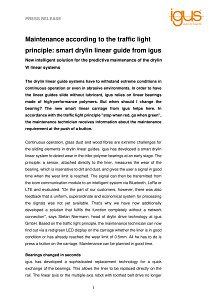Maintenance according to the traffic light principle: smart drylin linear guide from igus
March 26, 2020
New intelligent solution for the predictive maintenance of the drylin W linear systems

The drylin linear guide systems have to withstand extreme conditions in continuous operation or even in abrasive environments. In order to have the linear guides slide without lubricant, igus relies on linear bearings made of high-performance polymers. But when should I change the bearing? The new smart linear carriage from igus helps here. In accordance with the traffic light principle “stop when red, go when green”, the maintenance technician receives information about the maintenance requirement at the push of a button.
Continuous operation, glass dust and wood fibres are extreme challenges for the sliding elements in drylin linear guides. igus has developed a smart drylin linear system to detect wear in the tribo-polymer bearings at an early stage. The principle: a sensor, attached directly to the liner, measures the wear of the bearing, which is insensitive to dirt and dust, and gives the user a signal in good time when the wear limit is reached. The signal can then be transmitted from the icom communication module to an intelligent system via Bluetooth, LoRa or LTE and evaluated. “On the part of our customers, however, there was also feedback that a uniform, superordinate and economical system for processing the signals was not yet available. That’s why we have now additionally developed a solution that fulfils the function completely without a network connection”, says Stefan Niermann, head of drylin drive technology at igus GmbH. Based on the traffic light principle, the maintenance technician can now find out via a red/green LED display on the carriage whether the liner is in good condition or has already reached the wear limit of 0.5mm. All he has to do is press a button on the carriage. Maintenance can be planned in good time.
Bearings changed in seconds
igus has developed a sophisticated replacement technology for a quick exchange of the bearings. This allows the liner to be replaced directly on the rail. The linear axis or the multiple-axis robot with toothed belt drive no longer has to be disassembled. A free tool from igus helps in dismantling the old bearing and installing the new one. Downtime and maintenance costs are reduced to a minimum. The system can be put back into operation within a few minutes and in many cases does not even need to be referenced.


